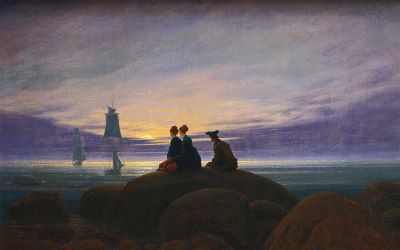Romantic Futures Symposium
Presented by the ERCC, this half-day graduate and early career researcher symposium will be held on Tuesday 19 November at the University of Melbourne. Registrations now closed.
'Romantic Futures' will bring together graduate students, early career researchers and senior academics to explore and debate the question of what it means to study the transition from Enlightenment to Romanticism and its legacies up to our current moment, and to consider the exciting intellectual possibilities offered by such work for emerging scholars. Speaking to their current research projects, senior ERCC researchers will share with participants the ways in which their work moves across temporal periods, geographic distances, disciplines and Schools, and suggest models for the type of work the ERCC hopes to foster. At issue will be the question of how Enlightenment-Romantic studies can be re-made and brought to bear upon the present, what role graduate and early career researchers can play in this process, and how engaging with a re-envisioned field might enable new collaborations and opportunities. As ever, our focus will be both backwards and forwards looking, with attention paid to how Enlightenment and Romantic texts and subjects generated their own narratives of futurity, and to how we might continue to generate definitions of our own field that are culturally, politically, and practically relevant to new generations of researchers.
Date: Tuesday 19 November 2019
Time: 2.00-6.00pm followed by dinner at 6:30pm at Tiamo in Carlton
Location: Linkway Meeting Room, John Medley Building (Building 191), Parkville campus, the University of Melbourne
We are delighted to announce that our keynote speaker will be Professor Theresa M. Kelley, who will present on the topic of 'Reading for the Future':
Abstract
For many thinkers, including Romantics themselves, their era was an age of prophecy - of revolution, radical change, new beginnings, perhaps even new worlds. Yet the Romantic writing that we identify as prophecy is strangely unable to predict the new realities and progress that we, like Romantic writers, thought they could deliver. Instead, prophetic writing in a Romantic key is preoccupied with impermanence, ruin, decline, calamity, loss, extinction, evanescence. If these motifs are the darkened mode of Romantic prophecy, how do the Romantics, and how do we, read for the future? I reply to this question by thinking about uncertainty, chance, and contingency, not sure-fire prophecy, as the narrative engines of Romantic futurity. At issue for the Romantic era, as for our own, is not knowing what the future will be (impossible to know in any era), but working out resources to keep at hand for when we or others get there.
Speaker biography
Theresa M. Kelley is Marjorie and Lorin Tiefenthaler Professor of English Emerita at University of Wisconsin-Madison. She is the author of Clandestine Marriage: Botany and Romantic Culture (Johns Hopkins, 2012), Reinventing Allegory (Cambridge, 1997), and Wordsworth’s Revisionary Aesthetics (Cambridge, 1988). She has published widely on Romantic poetics, aesthetics, visual culture, the matter of archives, and philosophy. She is the recipient of fellowships awarded by the American Council of Learned Societies, Simon D. Guggenheim Foundation, National Endowment for the Humanities, Henry E. Huntington Library, Yale Center for British Art and UW-Madison Institute for Research in the Humanities. She is currently working on two books: Reading for the Future and Color Trouble.
Other speakers include
Professor Peter Otto (the University of Melbourne), Professor Clara Tuite (the University of Melbourne), Dr Claire Knowles (La Trobe University), and Dr Sarah Comyn (University College Dublin)
Four travel bursaries of $325.00 will be available to graduate and early career researchers attending the symposium from interstate to assist with travel expenses and accommodation costs. To apply for one of these bursaries, please send an expression of interest and a short, 1-page CV to er-cc@unimelb.edu.au no later than 28 October 2019. Decisions on bursaries will be announced at the earliest possible date.
For more information or to register, please email Dr Alexandra Hankinson at er-cc@unimelb.edu.au.
RSVP DEADLINE: MONDAY 11 NOVEMBER

Image: Caspar David Friedrich, Moonrise by the Sea, c. 1822